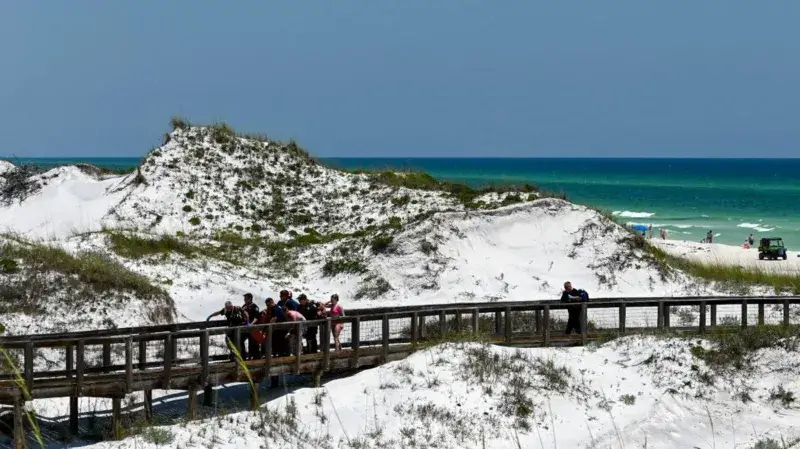In a not-so-great start to the summer, a Florida vacation hotspot has been closed temporarily due to two recent shark attacks. Both attacks were severe, with one victim needing their arm amputated. This unfortunate turn of events means local authorities might need to reinforce their beach safety protocols to minimize these attacks from happening. The community is (rightful) on edge as to what these attacks could mean. Will they close the beaches this summer? Will there be limits to beach time? How will they keep this sort of thing from happening so often?
Article Highlights
- Several miles of Gulf of Mexico waters in Walton County are closed due to recent shark attacks.
- Double red flags are flown on affected beaches, indicating the Gulf closure.
- A 45-year-old woman and two teenage girls were attacked within an hour and four miles of each other.
- Victims received immediate medical attention, including airlift transport and tourniquet application.
- Authorities are in contact with shark specialists to assess risks and prevent further incidents.
Details of the Shark Attacks
The first shark attack targeted a 45-year-old woman who was swimming around a sandbar. She unfortunately sustained injuries so severe, it lead to her arm needing amputation. The second attack occuring within the same hour and involved two teenage girls four miles away from the first attack. Thankfully, emergency responders got to the victims quickly, and all three were transported to trauma centers. Big props to the coordinated efforts of the Walton County Sheriff’s Office, local fire districts, and hospital staffs for taking care of the victims but, of course, residents and visitors alike want to know: how do we prevent attacks so severe from happening?
Statistics on Shark Incidents
Though the majority of shark attacks happen in Florida (the “Shark Attack Capitol of the World”), there are on average 70-80 unprovoked shark attacks per year. That seems like a low number, but these attacks can have devastating consequences. This is causing more pressure to be placed on the vigilance of first responders to make sure victims receive fast medical attention. Because, as we see in these two cases, attacks are rare but can be deadly. I mean, we know that lightning never strikes the same place twice, but who wants to get struck by lightning in the first place?
Beach Closures and Safety Measures
Authorities have closed several miles of the Gulf of Mexico beaches in response to recent attacks and vacationers will see double red flags on the beaches in the areas where the attacks occured. Authorities hope these measures will give beachgoers peace of mind and a slice of safety as experts figure out next steps. Shark specialists may be able to consult on other protocols to alleviate risk of future attacks. But in the meantime, the Walton County Sheriff’s office will continue monitoring the situation. But from us to the public: please be cautious and keep your head on a swivel out there. Danger is close, but it shouldn’t ruin your vacation as long as you stay aware and vigilant. Good luck!
Frequently Asked Questions
What Medical Treatments Are Victims Receiving After Shark Attacks?
Depending on the severity of the shark bite, tourniquets can be applied to control bleeding, airlifting to trauma centers is available, and medical staff is equipped for this sort of disaster.
How Are Local Businesses Affected by the Beach Closures?
Local businesses are suffering due to less foot traffic in restaurants, hotels, bars, and other social venues. Though some efforts are being explored to assist struggling businesses, there is clear financial loss from the recent beach closures.
Are There Alternative Activities for Tourists During the Beach Closure?
Of course! Cities aren’t made up of beaches – tourists can take advantage of museums, nature trails, restaurants, and multiple cultural events that Walton County has to offer during beach closures.
When Will the Beaches Be Safe to Reopen?
That depends on the authorities and experts working to make sure safety is the priority. When conditions seem secure and safe, beaches will re-open.
What Precautionary Measures Can Swimmers Take to Avoid Shark Encounters?
While you can’t 100% disrupt the probability of an attack, staying in groups, avoiding water at dawn and dusk, refraining from wearing shiny jewelry, and steering clear of fishing areas are good ways for swimmers to maintain safety. And, of course, heeding any local warnings – whether it’s from sinage or lifeguards, is a sure-fire way of stay safe.



